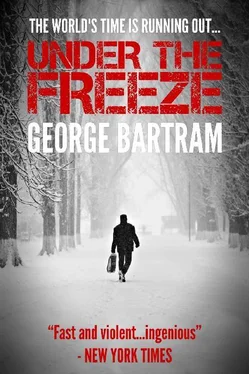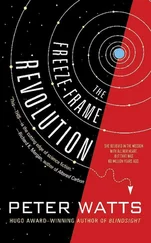“He might kill me to protect himself.”
“He might. Not likely.”
“So you don’t think your man was killed by Maxudov’s people?”
“I think nothing. I am puzzled .”
Tarp took an orange from a basket and began to peel it. “Suppose your man had not been killed. Suppose you got this same message in code from him. What then?”
Repin took a step, pulling at his lower lip. “I would have taken it rather seriously.”
“And so your man’s getting killed actually lowers the likelihood of somebody’s trying to feed us.”
“Yes, yes, I see what you mean.” Repin sat down. “If they want to give us false data, they would better have sent it through him.”
“Yes.”
Repin grunted. He picked up the piece of paper, dropped it. “I don’t like any of it.”
“Neither do I.”
“For once, I would like the bureaucracy. To check everything.”
“We have to check everything ourselves.”
Repin’s eyes glinted. “Buenos Aires?”
“I’d think so. If Schneider is a name there.”
“It is. I already checked. There are a number of Schneiders, but only one in chemicals. Schneider Chemical, Limited.”
“And Doctor Bonano?”
“Makes no sense.”
“Well?”
“There is one medical doctor named Bonano in Havana. He is head of an abortion clinic.”
Tarp ate part of the orange. “No, that makes no sense. Some other Doctor Bonano, then. Maybe in Buenos Aires.”
“You will go?”
“Yes. On my way to Moscow.”
“They are likely waiting there with one of their famous death squads.”
“Maybe.”
“How do you want it done?”
Tarp made a neat little pile of the orange peelings. “Get a place on a flight tomorrow to Mexico City. Order a passport in the same name from the Fourteenth Department here — my height and so on. Make some show of it. Make a separate reservation from Mexico City to Buenos Aires.”
“You will take these flights?”
“Of course not.”
“How will you go?”
“I don’t think I’ll tell you.”
“I think you are wise. It is humiliating, but you are wise.”
“I’ll need clothes.”
“Yes, yes — at once.”
“I’ll need a communication link.”
“Very well, but only after I leave Havana. I will give you a contact in Europe. Then we will work on getting you into the Soviet Union, assuming…”
“Yes, assuming I get out of Argentina. Yes.”
Tarp met Juana in the Plaza Marti at four o’clock, where they strolled in the sunshine with other couples, old and young — a boy going slowly on a bicycle so he could stay even with a girl, a woman in a wheelchair being pushed by an old man. Pigeons rose, swung across a quadrant of sky, settled again.
“I am going away,” he said.
“When?” She sounded listless. She looked as if she had slept badly.
“Tomorrow,” he lied.
“Where?”
“I can’t tell you. Have you learned anything?”
She shook her head.
“Will there be any trouble because of me?”
She shook her head again.
“The man at the ballet will get a message to you. To authenticate me. Then he’ll tell you how we will communicate.” She shrugged. The conversation seemed to bore her. They walked another twenty steps before she said anything, and then her voice was thin. “I want to tell you something,” she said, seeming both defiant and afraid of him.
“Well?”
She folded her arms over her breasts. “I want you to understand that I am ashamed of myself. For last night. For—” She shut her mouth tight as somebody walked passed them, as if she feared to be overheard. “For saying that I loved you.”
“Well, at least today you know better.”
She laughed, and a flight of pigeons went up as if the sound had frightened them. “No, today I don’t know better. It’s that I am ashamed of.” He saw her watch another woman who was crossing the square ahead of them; she seemed to be assessing the other woman, perhaps comparing herself. “I am not a child. I am a grown woman. I have had lovers. I have been infatuated. I was married for two years to a beautiful pig. I know what love is supposed to be like. I know what it is like.” She took her eyes away from the other woman. “It is not like this sickness.”
“What do you want me to do?” he said.
“What can you do? You are going away, that is good.” She hugged herself more tightly. “You don’t love me.”
“No.”
They walked a few steps. Her head was down now, as if she feared to stumble. “I must see you again,” she said.
“I’m not likely to come back to Havana.”
“Then I will come where you are. Moscow. Wherever.”
“Maybe you’ll get over the sickness.”
“Or maybe I can give it to you.” The feeble joke seemed to cheer her a little. She ran ahead of him to a handcart where a woman was selling ices, and then they went on around the plaza licking the ice out of the cold plastic cups. When he got some on his chin, she laughed at him, and she was transformed — simple, delighted, loving — and he was hurt by a realization of the price he was making her pay, the price he always made people pay, for the way he lived.
“Listen to me,” he said. “I’m going to give you a way to reach me if the regular route breaks down. Memorize it; don’t ever put it in writing. Don’t ever use it except in an emergency.” He gave her an address in Paris. “Anything that comes there addressed to Monsieur Chimère will get to me. Sign it ‘Mimosa.’ I’ll know it’s you.”
“My problem would be to get it out of Cuba.”
“You can manage that.”
They had nothing more to talk about. She seemed angry again. He promised to see her again before he left Havana, knowing as he said it that he would not keep his promise.
He took a bus to the airport in the twilight and bought a seat on the first outbound flight that had space. He used the Selous passport and had no trouble. He was wearing glasses and a rather silly mustache that had the odd effect of making him look both older and inconsequential.
The plane few to Jamaica. He went into the men’s room there, got rid of the glasses and the mustache, and bought himself a flight bag and a sporty wind jacket in an airport shop. He booked himself on a flight to Rio; while he waited for it, he dialed a number in Mexico City.
“Five seven seven five,” a masculine voice said in accented Spanish.
“I wanted Aatahualpa Curios.”
“Correct.”
“I’m looking for a one-armed buddha.”
There was a pause, then laughter. “Is this who I think it is?” the voice said in American English.
“Probably.”
“You looking for something with brass balls?”
“That’s the one.”
More laughter. “Hey, man, how the hell are you? Long time.”
“Long, long time. Can we talk?”
“Maybe yes, maybe no. Uncle’s got big ears. What can I do you for?”
“I need a piece. In Argentina.”
“Argentina’s a big country, m’friend.”
“Name a place.”
“Hold on.” Silence. “I gotta think. Hold on.” More silence. Then: “Fly to Santiago del Estero. Used to be able to get there from La Paz or Brasilia. You’ll be met. How do they recognize you?”
Tarp looked at the flight bag. “Brown shoulder bag. Cross on it in tape.”
“Okay. Cash on delivery.”
“Right.”
“What’s the purpose of this item you want?”
“Social work.”
“Got you. They’ll be looking for you. Hey, drop in ol’ May-hee-co sometime, you hear?”
“Will do.”
“Nice to talk to you. Hey, you ever see any of the guys?”
Читать дальше












